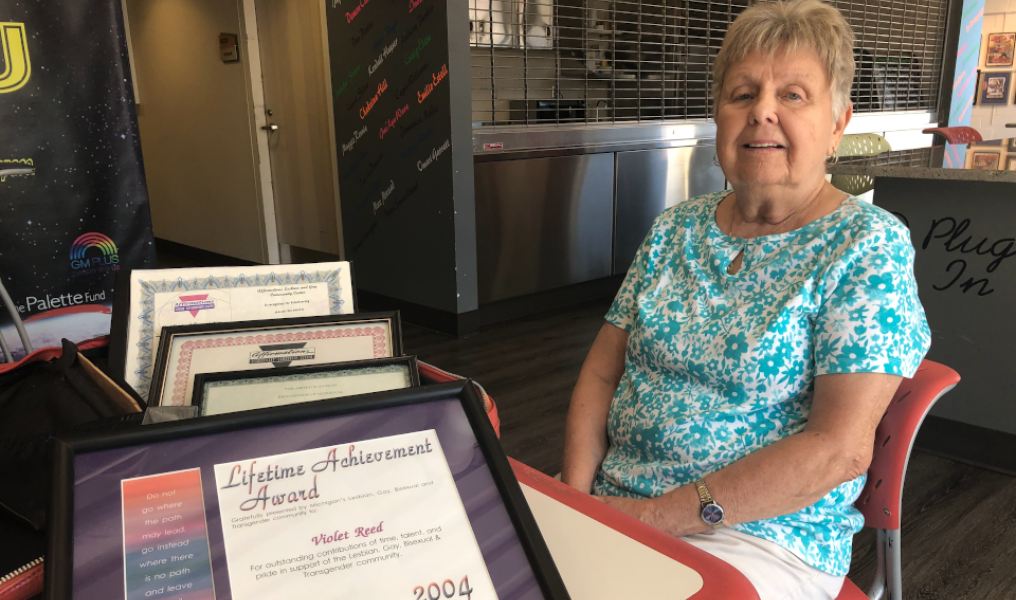Though Affirmations has been helped by many dedicated volunteers over the years, ones like Vy Reed are few and far between. Started in 1989, the Ferndale-based LGBTQ community center first connected with Reed in 1991. Since then, she has, in one form or another, maintained a relationship with the center as either a group facilitator or participant. And she's got the awards to show for it, too. To transport the dozens of plaques and certificates she's received over the years, Reed has to travel with a suitcase filled to its bursting point.
"I pulled these all out of a drawer and I told this gal at church about it and she says, 'Well, you've got to tell somebody about this,'" Reed said with a laugh.
When asked if volunteering at the center has enriched her life her answer was "definitely."
"I met more people than I would have ever met, and wherever I go I know somebody. So, it's a very, very nice thing and a great relief from the bars," she said. "… I know it allowed me to open up. I was kind of shy to begin with and even though I was a counselor at a school in the community, it gave me my voice to talk a little bit more."
These days at 81, Reed is involved mostly with the Senior Koffee Klatch, but she got her start facilitating groups when Affirmations' then-Executive Director Jan Stevenson swung by Reed's home for a party.
"She was trying to influence us to come, but nobody would come to Affirmations at that time. And so, I came and I did facilitator training," Reed said.
It was then that The Silver Foxes was born — an all-women's group targeted at connecting women who were 45 years old and up. Reed said that there's a drastic difference when comparing that original group to those that meet at the center today: in 2019 people are a lot more open.
"I had to find topics for us to talk about in each group, because if I went in unprepared without a topic, nobody knew what to say and nobody knew what to talk about. And at that time, anything sexual was taboo to talk about," she said, referencing the fact that today most groups don't require any prompting for lively discussion. "So, we'd talk about women's problems, but they didn't want to talk about that. Then I let them pick the topics, but as the years went on the group grew, until we really had almost 50 women."
That growth was good, and Reed said that eventually participants did seem to become more comfortable sharing with other group members. However, this did have an unintended side-effect: the more comfortable participants became with being open about their sexual orientation, the more likely they were to form groups of their own outside of the center.
"I started going to some of those groups to try and find out why," Reed said. "A lot of them thought that at that point people didn't want to be identified, so they thought if they came to a place that was identified as gay that it would be a problem."
As time went on, the stigma surrounding an LGBTQ community center began to dissipate and participants began to realize the value of being in a trained facilitator's group. It wasn't long before Reed was facilitating different kinds of meetings like GLAMOR — the center's first-ever all gender-inclusive group — and at one time the Senior Koffee Klatch. A qualified student counselor by trade, Reed said she brought elements from her work life to the group and vice versa.
"Counseling helped me a whole lot, although counseling is different than facilitating. A facilitator actually doesn't need to do a whole lot of talking and neither does a counselor; listening is the big thing. So, counseling trained me for that right away. And then facilitating, I found that I've been to some other groups where facilitators talk too much," she said with a laugh. "And so, I tried not to do that. And Rosemary [Ruppert] does a really nice job here now, too, [at the Senior Koffee Klatch]."
In her professional life, Reed recalled a time when her connections at Affirmations allowed her to help a young gay student who was having a hard time at school. This was despite her own difficulties at the time being open about her sexuality outside of the center.
"I knew he was gay and I couldn't say anything to him. I just couldn't because I was afraid," Reed said. "His mother was the issue and I was afraid it would somehow get back to her. So I made him an office kid and he came in and he was doing my filing for me and I had a file on Affirmations, and he was brave enough to come in and ask me about it. I said, 'Oh, yeah, that's a place where people can go to [for help].' So that's sort of deceptively how I [told him]. He did come here and I guess he got the help he needed."
Now retired and many years removed from teaching in a district where Reed felt the need to hide her sexuality, she said that had she known about Affirmations earlier she would have wanted to participate in a heartbeat.
"It's a place that you can go and help people and help yourself at the same time," she said. "I encourage people to volunteer and come in. And you meet different people and you also find out things that you may have never known about your community."
28 Years and Counting
A Look at the Dedication of Affirmations Volunteer Vy Reed










